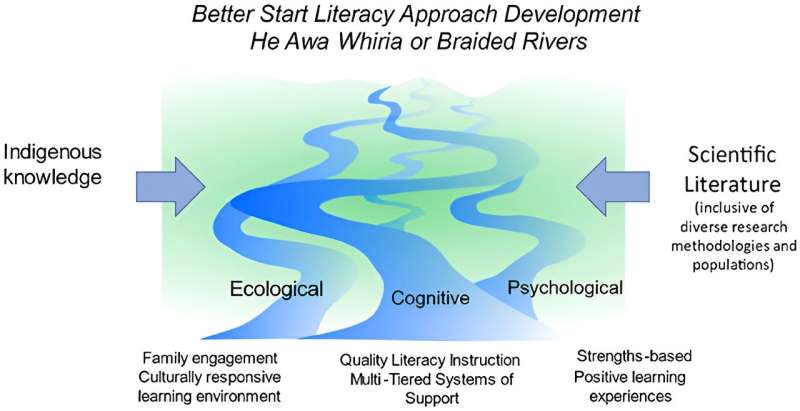
The He Awa Whiria framework for BSLA of braiding together multiple influences on children’s early literacy development. Credit: Frontiers in Education (2024). DOI: 10.3389/feduc.2024.1354182
A New Zealand-developed structured literacy program is delivering outstanding results for Kiwi children, new research by the University Of Canterbury shows.
The research paper, “Large scale implementation of effective early literacy instruction,” provides evidence that the Better Start Literacy Approach (BSLA)—developed by lead researchers at the University of Canterbury—is delivering real benefits for children in terms of improved literacy achievement outcomes in their early years at schools.
The study published May 21 in the journal Frontiers in Education examines assessment data gathered from more than 29,000 5-year-old children who received the BSLA between February 2020 and May 2023.
Key results of the research into BSLA’s effectiveness include:
BSLA is more effective for accelerating children’s early literacy skills than other classroom literacy approaches.
BSLA is equally effective across schools of different socio-economic demographics.
After 10 weeks of BSLA teaching, students of all ages showed a higher rate of proficiency on letter knowledge and phoneme awareness tasks than students of the same age who had not received BSLA teaching.
BSLA was effective across all cultural groups. Maori and Pasifika children showed accelerated learning in their early literacy skills.
By 30 weeks, children with greater learning needs who received BSLA small group teaching had caught up with their peers in word reading and spelling skills.
Professor Gail Gillon, Director of the University of Canterbury’s Child Well-being Research Institute and co-developer of BSLA, says the results of the latest research into the effectiveness of BSLA are significant.
“They demonstrate when our class teachers are well supported with quality professional learning and development based on the science of reading, they can rapidly develop children’s foundational literacy skills,” Professor Gillon says.
Professor Gail Gillon says the results are important for providing evidence of effective structured literacy approaches designed for the New Zealand context.
“This is critical given the government’s recent announcement that by Term One, 2025, all state schools will be required to teach using a proven ‘structured literacy’ approach.
“Because it was developed by New Zealand researchers for use in New Zealand schools, the BSLA has significant advantages for teachers and children. It is aligned to inclusive and culturally responsive teaching practices. We need to ensure that large-scale implementation of structured literacy approaches is reducing current education inequities. The data from teachers implementing BSLA provide evidence that the approach is effective in working toward this aspiration.”
The advantage of BSLA is that it was designed for large-scale application, Professor Gillon says, meaning it is an ideal fit for the New Zealand-wide requirement for a structured literacy approach. Quality online learning with follow-up in-class coaching and support for teachers from literacy specialists in their community, means that teachers across the country—in urban or rural areas—can access and implement the approach effectively.
The positive results published in the research article are endorsed by Marian Meehan, Principal / Tumuaki of Khandallah School in Wellington, who says that the BSLA system has produced a significant shift in all tamariki learning to read and write.
“Our data show that BSLA teaching has really increased both writing and reading in our children. The program has raised children’s confidence, particularly in learning to write, and it’s exciting to see their progress as they attempt to spell new and exciting vocabulary,” Meehan says.
She adds that the appeal of BSLA is that it is New Zealand researched, has New Zealand-themed readers, comes with support from the university, is grounded in the science of learning, and comes with online comprehensive assessments.
“Children are happy to be voicing their decisions on why they believe a word is pronounced in a certain way and how a word would be spelt. They have significant power and control in the learning to read and spell. Parents are constantly using the word ‘amazing’ to describe the literacy progress and knowledge their child is developing.”
More information:
Gail Gillon et al, Large scale implementation of effective early literacy instruction, Frontiers in Education (2024). DOI: 10.3389/feduc.2024.1354182
Citation:
Structured early literacy approach achieves outstanding results for children in New Zealand (2024, May 23)
retrieved 23 May 2024
from https://phys.org/news/2024-05-early-literacy-approach-outstanding-results.html
This document is subject to copyright. Apart from any fair dealing for the purpose of private study or research, no
part may be reproduced without the written permission. The content is provided for information purposes only.
>>> Read full article>>>
Copyright for syndicated content belongs to the linked Source : Phys.org – https://phys.org/news/2024-05-early-literacy-approach-outstanding-results.html










